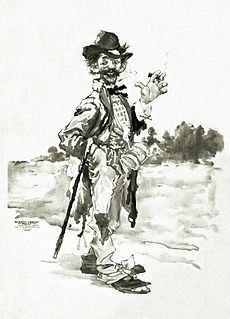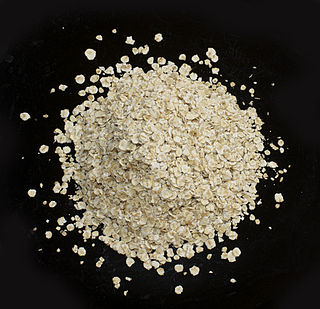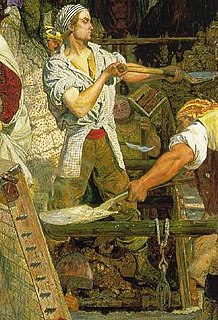
Eric Arthur Blair, better known by his pen name George Orwell, was an English novelist and essayist, journalist and critic, whose work is characterised by lucid prose, awareness of social injustice, opposition to totalitarianism, and outspoken support of democratic socialism.

Stout is a dark beer. There are a number of variations, including Baltic porter, milk stout, and imperial stout; but the most common variation is dry stout, as exemplified by Guinness Draught, the world's best-selling stout. Stout is a top-fermented beer.

Down and Out in Paris and London is the first full-length work by the English author George Orwell, published in 1933. It is a memoir in two parts on the theme of poverty in the two cities. The first part is an account of living in near-destitution in Paris and the experience of casual labour in restaurant kitchens. The second part is a travelogue of life on the road in and around London from the tramp's perspective, with descriptions of the types of hostel accommodation available and some of the characters to be found living on the margins.

A tramp is a long-term homeless person who travels from place to place as a vagrant, traditionally walking all year round. The word tramp became a common way to refer to such people in 19th-century Britain and America.

Porridge is a food commonly eaten as a breakfast cereal dish, made by boiling ground, crushed or chopped starchy plants—typically grain—in water or milk. It is often cooked or served with added flavorings such as sugar, honey, (dried) fruit or syrup to make a sweet cereal, or it can be mixed with spices and/or vegetables to make a savoury dish. It is usually served hot in a bowl, depending on its consistency. Oat porridge, or oatmeal, is one of the most common types of porridge. Gruel is a thinner version of porridge.

The River Orwell flows through the county of Suffolk in England. Its source river, above the tidal limit at Stoke Bridge, is known as the River Gipping. It broadens into an estuary at Ipswich where the Ipswich dock has operated since the 7th century and then flows into the North Sea at Felixstowe the UK's largest container port after joining with the River Stour at Shotley forming Harwich harbour.

Oatmeal is a type of coarse flour made of hulled oat grains (groats) that have either been milled (ground), steel-cut, or rolled. Ground oats are also called "white oats". Steel-cut oats are known as "coarse oatmeal", "Irish oatmeal" or "pinhead oats". Rolled oats can be either thick or thin, and may be categorized as "old-fashioned", "quick", or "instant", depending on the cooking time, which is shortened by the size of the oats, precooking, and sometimes the addition of enzymes.

The Battle of Sluys, also called the Battle of l'Ecluse, was a naval battle fought on 24 June 1340 between England and France, in the roadstead of the port of Sluys, on a since silted-up inlet between Zeeland and West Flanders. The English fleet of 120–150 ships was led by Edward III of England and the 230-strong French fleet by the Breton knight Hugues Quiéret, Admiral of France, and Nicolas Béhuchet, Constable of France. It was one of the opening engagements of the Hundred Years' War.

Navvy, a shorter form of navigator (UK) or navigational engineer (US), is particularly applied to describe the manual labourers working on major civil engineering projects and occasionally to refer to mechanical shovels and earth moving machinery. The term was coined in the late 18th century in Great Britain when numerous canals were being built, which were also sometimes known as "navigations", or "eternal navigations", intended to last forever.

The Sargasso Sea is a region of the North Atlantic Ocean bounded by four currents forming an ocean gyre. Unlike all other regions called seas, it has no land boundaries. It is distinguished from other parts of the Atlantic Ocean by its characteristic brown Sargassum seaweed and often calm blue water.

White pudding, oatmeal pudding or mealy pudding is a meat dish popular in Scotland, Ireland,, Northumberland, Nova Scotia, and Newfoundland.

Thomas Brassey was an English civil engineering contractor and manufacturer of building materials who was responsible for building much of the world's railways in the 19th century. By 1847, he had built about one-third of the railways in Britain, and by time of his death in 1870 he had built one in every twenty miles of railway in the world. This included three-quarters of the lines in France, major lines in many other European countries and in Canada, Australia, South America and India. He also built the structures associated with those railways, including docks, bridges, viaducts, stations, tunnels and drainage works.
Hasty pudding is a pudding or porridge of grains cooked in milk or water. In the United States, it often refers to a version made of ground corn. Hasty pudding is mentioned in a verse of the early American song "Yankee Doodle".

Brose is a Scots word for an uncooked form of porridge: oatmeal is mixed with boiling water and allowed to stand for a short time. It is eaten with salt and butter, milk or buttermilk. A version of brose is called crowdie, made with ground oats and cold water, though that term is more often used for a type of cheese.

Laverbread is a food product, made from an edible seaweed, consumed mainly in Wales as part of local traditional cuisine. The seaweed is commonly found around the west coast of Great Britain and east coast of Ireland along the Irish Sea, where it is known as slake. It is smooth in texture and forms delicate, sheetlike thalli, often clinging to rocks. The principal variety is Porphyra umbilicalis. Porphyra is classified as red algae; it tends to be a brownish colour, but boils down to a dark green pulp when prepared. Laver seaweed has a high content of dietary minerals, particularly iodine and iron. The high iodine content gives the seaweed a distinctive flavour in common with olives and oysters.

The jolly boat was a type of ship's boat in use during the 18th and 19th centuries. The origins of the name is the subject of debate, but it was by the 18th century one of a number of ship's boats, and was used mainly to ferry personnel to and from the ship, or for other small scale activities. The design continued to evolve throughout its period in service.

A Staffordshire oatcake is made from oatmeal, flour and yeast to make a dense pancake. It is cooked on a griddle, "backstone" or "baxton". The oatcake is a local speciality in the North Staffordshire area of England, specifically Stoke-on-Trent. They are normally referred to as Staffordshire oatcakes by non-locals, because they were made in and around Staffordshire and Cheshire; locally they are simply called "oatcakes".

An oatcake is a type of flatbread similar to a cracker or biscuit, or in some versions takes the form of a pancake. They are prepared with oatmeal as the primary ingredient, and sometimes include plain or wholemeal flour as well. Oatcakes are cooked on a griddle or baked in an oven.
TS Pretoria was a ship that had a long and varied career as first a German cargo liner, then a U-boat depot ship, hospital ship, British troop ship, Muslim pilgrim ship and finally an Indonesian naval accommodation ship.



















